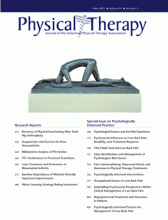My message is simple: If you're not interested in low back pain and you're about to toss this issue aside, don't! As co-editors Chris Main and Steven George make clear, the purpose of the special issue published within these covers is “to persuade biomedically oriented physical therapists of the need for a shift in focus…[to include] consideration of psychosocial factors…as potential obstacles…and as worthwhile treatment targets in their own right.”1(p610) I urge everyone to read this issue and substitute a diagnosis that is relevant to your practice or research interest. This issue combines expertise from physical therapists and psychologists to define psychologically informed physical therapist practice, and the content is relevant regardless of clinical specialty.
The authors recognize that physical therapists have been exposed to the importance of psychosocial factors both through their professional education and in the practice setting. It is quite easy, in fact, to find references to this topic in PTJ. I can develop an argument from articles published beginning in the late 1990s through today that we have recognized the importance of psychosocial factors but have not yet figured out what to do about them:
A paper by Jette and Downing2 in 1996 reported that psychological distress …












